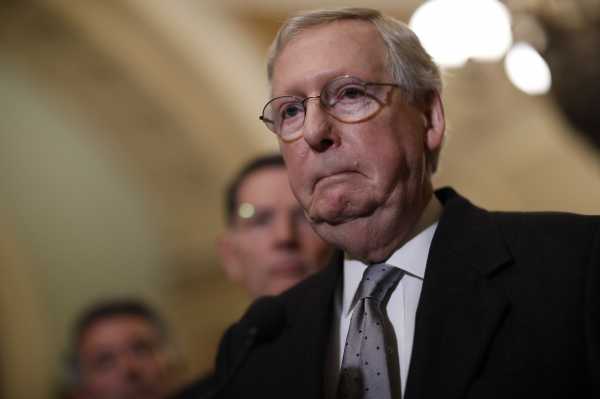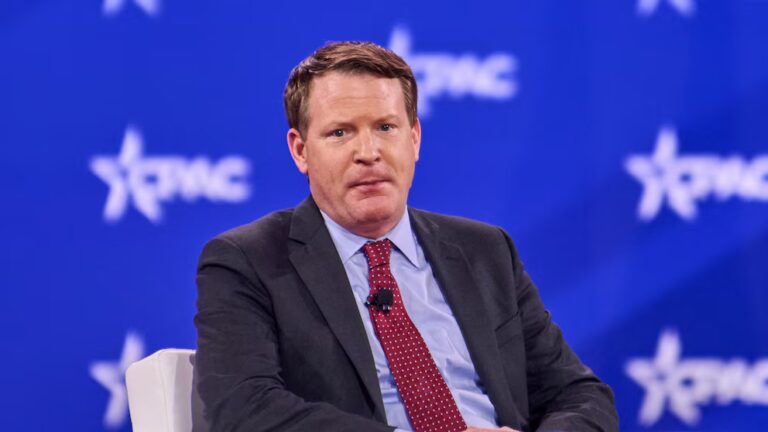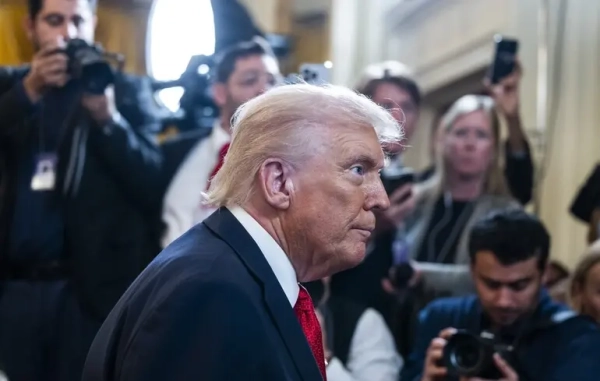
Democrats face an extraordinarily difficult map in their effort to retake the Senate in 2018 — but the latest fundraising numbers should be encouraging for the party.
Top Democratic contenders ended the first quarter of this year with more cash on hand than their top Republican rivals in two GOP-held seats — Arizona and Texas — and put up comparable numbers in Nevada as well.
Meanwhile, in the many seats Democrats have to defend this fall, the incumbents have more than twice as much cash on hand as their top Republican challengers in every top-tier race — including in all 10 states Trump won in 2016 where Democratic incumbents are up.
These fundraising numbers don’t tell the whole story, as Republican candidates have in the past disproportionately benefited from big spending by deep-pocketed outside groups. Furthermore, many GOP candidates are enmeshed in competitive primaries right now, and fundraising could pick up for the eventual nominees.
Still, these are essentially the sorts of fundraising numbers Democrats should hope to see in their uphill battle to regain control of Congress’s upper house.
Democrats are making a push for four GOP-held seats
To retake the Senate, Democrats need to pick up, on net, two seats. One way the party could do that would be by defending all of their own incumbents while winning two races for GOP-held seats.
Currently, the party sees four promising pickup opportunities.
Nevada is the only state Trump lost where Republicans have to defend a Senate incumbent. And while that incumbent, Sen. Dean Heller, did end the quarter with $4.4 million on hand, that’s not all that much more than the likely Democratic nominee, Rep. Jacky Rosen (D), who has about $3.5 million. The good news for Heller is that he no longer has to worry about a primary, since challenger Danny Tarkanian switched to run for the House of Representatives instead.
In Arizona, for the open seat vacated by retiring Sen. Jeff Flake (R), Rep. Kyrsten Sinema (D) has amassed a war chest of more than $6.6 million on hand — more than twice as much as the top three Republican candidates combined have on hand. Those candidates — Rep. Martha McSally, Kelli Ward, and Joe Arpaio — are currently locked in a competitive three-way primary.
Texas features the true fundraising star for the Democrats, Rep. Beto O’Rourke (D). Looking only at official campaign accounts, O’Rourke has far outraised Sen. Ted Cruz overall, $13 million to $9 million, and ended the quarter with about $800,000 more cash on hand than the GOP incumbent. (Cruz’s team prefers to add PAC fundraising to the total, and when that’s considered, the two have about even cash-on-hand numbers.)
However, in Tennessee — where polls have shown the Democratic candidate, former Gov. Phil Bredesen, ahead of likely GOP nominee Rep. Marsha Blackburn — Democrats had a less impressive cash showing. Bredesen ended the quarter with $1.7 million on hand, compared to Blackburn’s $5.9 million. Still, considering that Bredesen is a wealthy businessman with a fortune of more than $92 million, it seems unlikely that he’ll lack for cash here. (He’s already loaned his campaign $1.4 million.)
The special election in Mississippi is often mentioned as an unlikely but perhaps not impossible pickup opportunity for Democrats — but with Sen. Thad Cochran (R) just resigning on April 1, the race is new and fundraising numbers haven’t been reported yet.
Democratic incumbents have much more cash than their GOP challengers
The biggest problem with Democrats’ Senate hopes this year is that they have to defend so many seats not just in states Trump won (though that’s true) but in states Trump won overwhelmingly.
Yet in those five deep-red states, the Democratic incumbents all look strongly positioned from their fundraising numbers — indeed, they each have more than twice as much cash as their top GOP challenger.
- West Virginia: Sen. Joe Manchin (D) has $5.4 million on hand, and none of his potential opponents topped $1.3 million (though one, Don Blankenship, is a wealthy businessman who could self-fund should he win the nomination).
- North Dakota: Sen. Heidi Heitkamp (D) has $5.3 million on hand, while her likely opponent Rep. Kevin Cramer (R) has $1.8 million (though Cramer only announced his candidacy in February).
- Indiana: Sen. Joe Donnelly (D) has $6.3 million on hand, more than twice as much as any of his potential opponents. (Again, though, should business executive Mike Braun win the nomination, he could self-fund.)
- Missouri: Sen. Claire McCaskill (D) has a whopping five times as much cash on hand as likely GOP nominee Josh Hawley — $11.5 million to $2.1 million.
- Montana: Sen. Jon Tester (D), then, has more than 10 times as much cash on hand as any of his potential opponents, with $6.8 million in the bank.
Then there is another tier of potentially competitive races in purple states.
- Florida’s race will feature the very wealthy Gov. Rick Scott (R) challenging Sen. Bill Nelson (D) and likely self-funding, but Scott has only just entered the race and hasn’t reported fundraising numbers yet. Nelson has $10.5 million on hand.
- Wisconsin: Sen. Tammy Baldwin (D) — whom conservative outside groups have been spending millions against — has $7.8 million on hand, more than nine times more than either of her two potential opponents, Kevin Nicholson and Leah Vukmir.
- Michigan: Sen. Debbie Stabenow (D) has $8.8 million on hand, compared to $3.9 million from self-funder Sandy Pensler and $1.1 million from John James, a black veteran whose candidacy has excited conservative activists.
- Ohio: Sen. Sherrod Brown’s (D) $11.8 million on hand is well ahead of self-funder Jim Renacci’s $4.2 million.
- Pennsylvania: There’s been more and more chatter that Republicans see little hope of defeating Sen. Bob Casey (D), and the incumbent has $10 million in the bank compared to likely challenger Lou Barletta’s $1.6 million.
In fact, the only state in which a Republican Senate candidate currently has more cash on hand than a Democratic incumbent is New Jersey, where business executive Bob Hugin has put more than $7.5 million into his own campaign, giving him more in the bank than Democratic Sen. Bob Menendez. This seat is sometimes mentioned as a stretch target for Republicans, particularly given Menendez’s (dropped) corruption charges, but it will be a challenge for a Republican to win this blue state if it really does wind up being a Democratic wave year.
Sourse: vox.com






